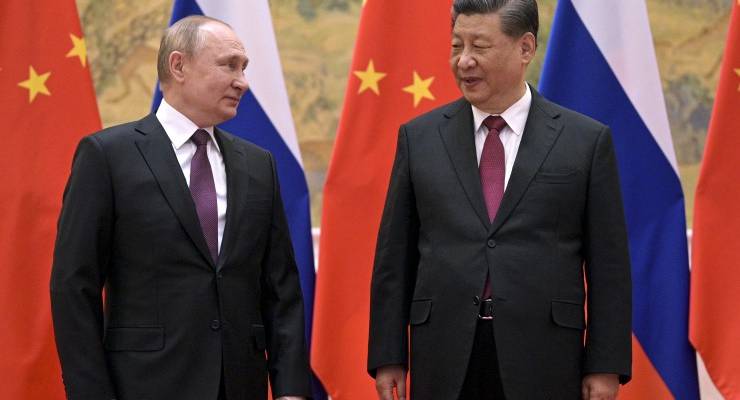
When Chinese President Xi Jinping and Russian President Vladimir Putin met before the opening ceremony of the 2022 Beijing Winter Olympics last Friday, it was their first face-to-face meeting in almost two years.
Amid the standoff between Russia and the West over Putin’s apparent preparations to invade Ukraine, observers watched closely for signs that the two leaders would intensify their so-called axis of authoritarianism — what many have described as a nascent alliance of two revisionist, anti-Western powers.
Expectations varied from Chinese economic support that would help Russia withstand Western sanctions should it invade Ukraine to joint statements on Taiwan, signalling a possible, albeit unlikely, two-front conflict that could see China move against the island nation at the same time.
But if you look a little closer at China’s readout from the summit, it becomes apparent that Putin left Beijing without having accomplished much at all. Sure, Russia and China announced a 30-year energy deal to deliver natural gas from Russia’s far east to north-eastern China, but it will be years before a proposed pipeline becomes fully operational. Regarding Ukraine, a joint statement included a brief mention of support for Putin’s demands for new security guarantees from NATO.
But the summit also showed that Xi remains constrained by forces outside of his control. While offering his fellow autocrat some support, Xi does not want to risk damaging China’s already strained relations with Europe, particularly given growing concerns about China’s rapid economic slowdown.
China’s exports to the European Union and Britain combined are almost 10 times those to Russia. With growing restrictions on technology transfers and Chinese investments as well as loud calls to reduce supply chain dependency on China, the last thing Xi wants is for China’s economy to face possible post-invasion sanctions should his support for Putin be too overt.
And therein lies an opportunity for the United States and its European partners to exploit the Sino-Russian relationship’s frictions — for example, by threatening to target China’s economic interests in Europe unless Beijing immediately dials back its support for Russia’s belligerence.
Although Xi and Putin are sometimes described as representing two sides of the same authoritarian coin, there are clear limits to the top-down relationship that has developed between their two countries.
Even as Beijing and Moscow coordinate votes in the United Nations Security Council, build the Shanghai Cooperation Organisation into a regional bloc, hold a growing number of joint military exercises, and complete major arms deals, this has not yet translated into deeper economic or societal linkages between China and Russia. In other words, compared with Western alliances, their cooperation often looks transactional and opportunistic — and that did not change last week.
The relationship is very uneven: Russia depends far more on China than the other way around. Sure, China is staring down ever-growing energy demands amid widespread shortages, but Russia is even more desperate to find new customers for its oil and gas. In Beijing and Moscow, some elites have expressed reservations about imbalances in the partnership. Chinese commentators, in particular, have pointed to the risk of alienating European business partners, whose economic importance to China’s development is immeasurably greater than that of Russian commodity suppliers.
The summit’s stakes could not have been higher for Xi. As Beijing remains laser-focused on avoiding negative media coverage of the 2022 Winter Olympics, Xi has absolutely no desire for Putin to pull him into a faraway conflict. Bad enough that Beijing has had to endure a raft of negative publicity about its atrocities against Uyghur Muslims and Tibetans as well as recent economic data revealing serious cracks in China’s economic model — which suddenly makes China’s rise look a lot less inevitable.
This explains why Beijing went out of its way to downplay the significance of the Xi-Putin meeting. One needs to look no further than the statements issued by both countries at the summit’s conclusion and how differently they were covered by their respective governments.
Take the much-reported comment on NATO in the two leaders’ joint statement: a single sentence buried in the 28th paragraph. It noted that both countries oppose the “continued expansion of NATO” and believe that NATO should “abandon the ideology of the Cold War” — a weak, boilerplate statement considering Putin’s much more extreme demands, including that NATO roll back its commitments even to existing members.
More significantly, NATO and Ukraine were absent from the Chinese foreign ministry’s post-summit readout as well as from coverage of the summit by Xinhua, China’s official state press agency.
China’s version of the joint statement reiterates that China “understands” and “supports” the proposals put forward by Russia to create long-term, legally binding security guarantees in Europe, but it otherwise steers clear of the current standoff over Ukraine. What’s more, mere hours after the summit, Xinhua’s homepage was quickly overtaken by news about the Olympics, with the summit relegated to a single news item among many. It should be abundantly clear: this is not how government news services celebrate a strategic partnership.
Beijing’s intentional reticence to downplay its support for Moscow’s grievances against NATO reflects more than a desire to prevent the Ukraine crisis from overshadowing the Olympics. For Xi, it comes down to dollars and common sense, namely his desire to avoid unnecessarily alienating his economic partners in Europe at a time when China’s economy is already on the ropes.
Relations between Beijing and Brussels have been in a downward spiral for more than two years. A proposed EU-China investment pact was indefinitely shelved last year amid rising European concerns about China’s deceptive, non-market economic practices as well as China’s systematic persecution of Uyghur Muslims.
When China recently blocked most trade from NATO member state Lithuania after it deepened its ties with Taiwan, the EU quickly rallied to Vilnius’s defence, suing China for discriminatory trade practices at the World Trade Organization. In recent months, Xi has personally stepped in to try to soothe relations with Europe. The most obvious reason: China is banking on enhanced ties to help it weather the current economic storm — including with the 19 European NATO members that have signed on to Xi’s signature Belt and Road Initiative.
Moreover, Beijing’s muted support for Moscow’s diplomatic demands — whether one considers them reasonable or not — should not be misinterpreted as a blessing for war. A Russian attack on Ukraine and the sanctions backlash from the West would shock energy and other commodity markets as well as weigh heavily on global economic sentiment.
With Beijing warning that economic stability remains the Chinese Communist Party’s top priority for 2022, a potential war in Europe could thus hasten China’s already rapid economic slowdown and make its highly optimistic growth targets even less attainable. That, in turn, would undermine Xi’s most important goal of all: his appointment for another five-year presidential term at this October’s Chinese Communist Party National Party Congress.
The emerging clash between China’s growing economic dependence on Europe and closer relations with Russia, especially as Putin becomes more aggressive in his relations with the West, gives Washington and its European allies some much-needed leverage.
They should play on this divergence in Russian and Chinese interests by openly rebuking China — both for interfering in NATO affairs and for supporting Russian aggression in Europe. European countries should warn they will reevaluate economic collaboration with China, including their commitments to the Belt and Road Initiative, unless Beijing immediately reverses course.
For its part, Washington should make clear to Beijing that the US Treasury will crack down hard on any Chinese entities that help Russia circumvent the sanctions that Washington will impose if Moscow once again attacks Ukraine.
These efforts could highlight cracks in the Chinese-Russian alliance, make sure that Putin remains on his own regarding Ukraine, and signal to China that there are limits to its malign influence in Europe. All that was made apparent by the rather underwhelming Xi-Putin summit last week.









Bunch of clichés plucked from US and EU media. No substance and no neutral analysis. Grow your own balls. Cina never ever criticised expansion of NATO. It is nothing mute, but fundamental shift in foreign policy.
Sorry – I don’t see how American new outlets provide anything of substance or interest. Just the same old crap. Blind Freddy could see that China would not want to see military conflict in the Ukraine. But in a few years time, the new US President ( Trump ? ) might.
Waste of time reading this article.
Oh – and from The Conversation today “Labor led the Coalition by just 47-46 in this week’s poll, down from 50-43 last fortnight”.
https://theconversation.com/nsw-byelections-preview-federal-coalition-rebounds-in-essential-poll-176348
Sorry for the above reply. Meant to post this to the “The Oz publishes 31-year-old ‘exclusive’ …” article. Eating lunch in front of the PC with plate on lap, fork in one hand and mouse in the other with 2 tabs open – not a good idea :-(.
Yes, I’m waiting for Crikey to give us Chinese and Russian ‘analysis’ on the US and it’s lapdog, Australia. I’m sick of 99% of international commentary being spoken with a BBC or US accent.
Bit stark or black and white, have you ever considered input from other medium players e.g. EU or Asian nations? Why the old super powers that be…?
Quite agree, Drew. I think we should be hearing more from our SE Asian neighbours about what they think of China and AUKUS and our nuclear subs. I hear they’re very unhappy with the latter two, and not so concerned about China.
My point was that constantly presenting the Anglo imperial viewpoints as independent ‘analysis’ is as crazy as thinking the Russian or Chinese viewpoints would be independent and objective.
Logically the reunified motherland narrative must, at some time, turn to the territories lost by China to Russia in 1858 and 1860. Be interesting to see how that works out.
If looking purely at Russia and China into the long term, China can play the long game with some demographic power dry (e.g. raise retirement age) to keep the society and the economy productive; China dwarfs Russia.
Issue of Russia that is never mentioned is increasing demographic decline in regions due to very low fertility and negligible immigration, ageing/declining working/military age cohorts, whole villages disappearing, and youth &/or working age emigrating for opportunities and desire to live in western liberal democracies aka EU.
The Economist ran a feature article several years with the cover image of the Chinese dragon slowly ingesting the Russian bear…..
It’s a relationship of convenience as such – they are using each other – nothing sincere, but plenty enough for one of them to make some bold bloody mistakes. Like most ego maniacs, these despots will likely also bring themselves unstuck somehow, in someway – sooner rather than later let’s hope…